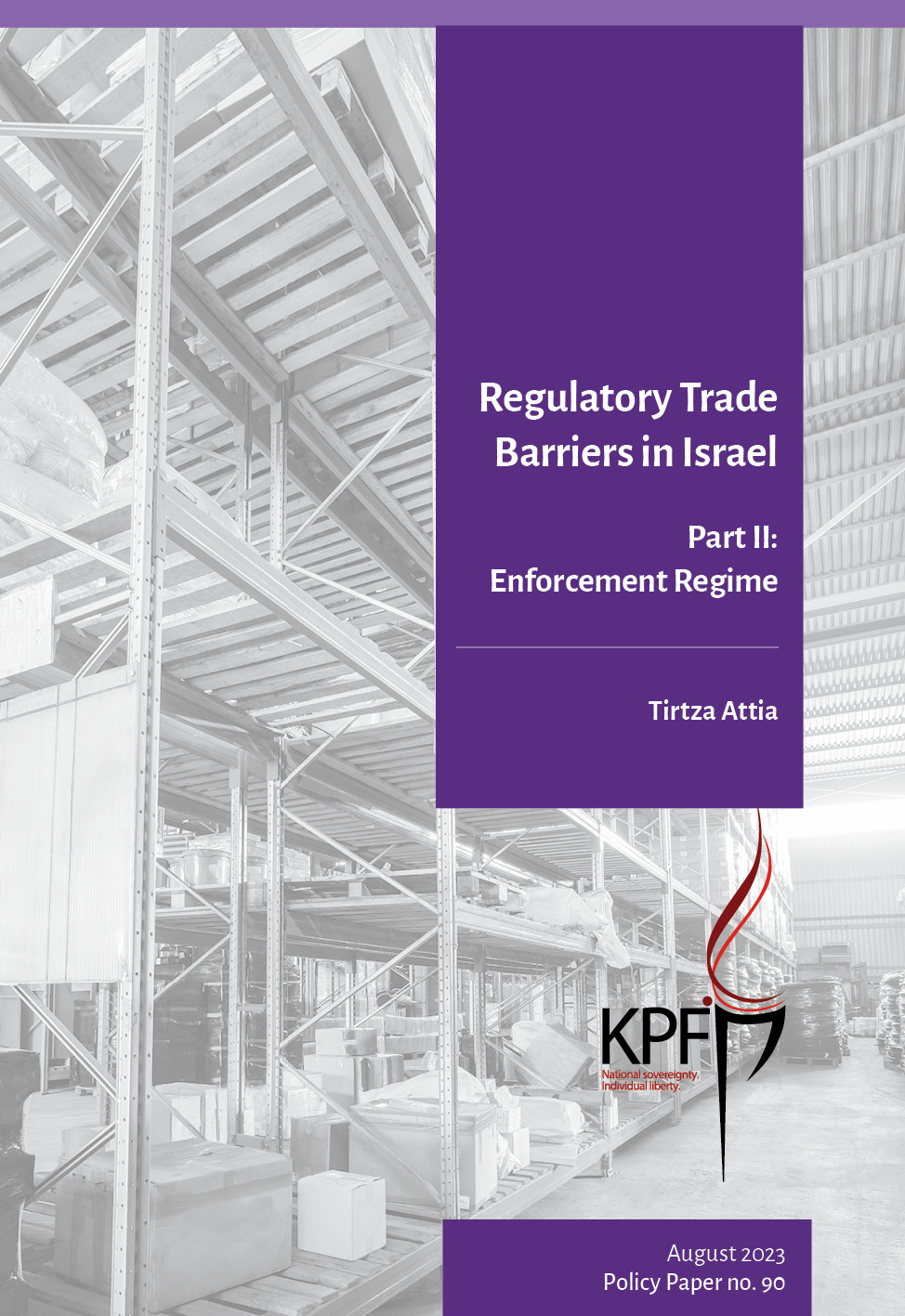While Part I on regulatory trade barriers focused on the regulation itself, Part II looks at the way the trade regulation is enforced, i.e., how the State of Israel ensures compliance with its regulations.
The paper details the regime of licenses, approvals and inspections required for Israeli imports and empirically outlines the flaws therein in comparison with other developed countries.
The first chapter examines the import license required by law in addition to business and other licenses that importers are forced to obtain.
The second chapter looks at the many failings in obtaining such a license: in information, accessibility, service, costs, and competition. The third chapter reviews the failings in the process of importing officially standardized goods, from the categorization procedure through the arduous path to obtain approvals and enter the goods into the country. Both chapters detail recommendations at the end.
Summary:
In broad terms, Israel operates on a pre-market surveillance basis, in contrast to the European model which is a post-market surveillance one. This means that in Israel, every regulated item is inspected at the point of entry and determined eligible or not. Europe instead places the responsibility to comply with regulations on the manufacturers and importers, with the regulatory body only inspecting random samples of the goods being sold on the shelves. The latter model allows for the free flow of trade and is more efficient at protecting consumers by direct oversight of the end point, where they encounter those goods.
In Israel, more than 200 import licenses are required as a prerequisite for importation. Each of these carries various legal requirements before they can be obtained. These licenses restrict more than 7,000 items at customs. Importers are required to produce various certifications of requirements met, such as warehouse conditions and product safety and quality. Nearly 63% of import licenses also require a business license under the 2013 Business Licensing Order (Businesses Requiring Licensing). The business licensing procedure adds an additional burden of obtaining certification, such as from local authorities and the National Fire and Rescue Authority, and imposes burdens of time and costs. Many of the procedures for obtaining a license are not available online and some of them are not available in person either (only 25% of licenses have public service hours).
The license requirements raise the costs of importation and prevent competition and speedy importation by sporadic importers, i.e. entrepreneurs who do not specialize in imports but do so when the economic opportunity arises. In order to wade through the process, importers face high costs, a need for expertise and the assistance of mediators. This requirement poses both cost and information barriers.
In addition to the licensing issue, the procedure for importing officially standardized goods in Israel is cumbersome and costly. The pre-import procedures include obtaining sample approvals before a shipment arrives in the country and producing shipment approvals at port. The process is as follows: (1) Categorizing the item intended for import by a customs broker, (2) purchasing the standardization details from the Standards Institution of Israel in order to obtain full information on all legally required standards, (3) obtaining approval to import a sample of the item, (4) obtaining “model” approval from the Standards Institution of Israel which tests the sample, a process both lengthy and costly and often redundant (small variations of the same item are required to undergo the entire process), (5) obtaining an importation license, (6) arranging shipment and storage – goods cannot be released to the country before all taxes are paid and all regulatory approvals checked, which process can take time, (7) obtaining shipment approval – certain items require certification that shipment contents match the approved model, a process that is necessary for every shipment of goods, often with lengthy waiting times for such inspection to be performed further lengthened if defects found must be corrected, (8) releasing the goods and preserving the product file – importers are required to preserve and renew the product files that contain all the products’ information and certifications.
The following example illustrates the costs of such a process for ten electrical items:
- Sample approval: 2,800 NIS X 10
- Shipment approval: 4000 NIS X 10
- Storage costs pending approval: 3000 NIS per month X 6
- Defects correction costs: 25,000 NIS
Recommendations:
- Shifting to single window, declarative licenses. The single window paradigm being promoted for trade in developed countries makes it possible for an importer to deal with a single regulatory agency that integrates all information and requests.
In Israel, all systems but the MASLUL system (the Status System for Licenses and Approvals for Importers) should be abolished, making it the central interface for all import license requests. As is the practice in Europe, MASLUL will issue automatic licenses based on a declaration for items in the food, chemicals, and cosmetics categories; all other goods will be inspected at the market point and require no MASLUL registration. Any rejection of license must be backed by reasoning.
- The tax authorities will preserve and publish all documentation of legal approvals at customs in a publicly available manner so that importers can know what is required of them.
- Service call centers must be established to provide importers with services and information in regard to the importation procedures as well as to register complaints of unlawful license rejection and waiting times.
- New importers should be provided with guidance and explanations of the licensing and enforcement procedures.
- A uniform oversight mechanism should be formed for registration fees in the MASLUL system. A committee will determine a general fee to be collected for registration only and not for additional import actions such as item registration and port release.
- The importer will hold the product file containing all certification of regulatory requirements met and produce it to authorities on demand in any case of inspection, as is the case in Europe.
- Abolish the sample import fee – as in Europe, importers should be free to import any item (aside from food and livestock) in amounts less than a specified sum, above which legal requirements are obligatory.
For the full policy paper in Hebrew see here



